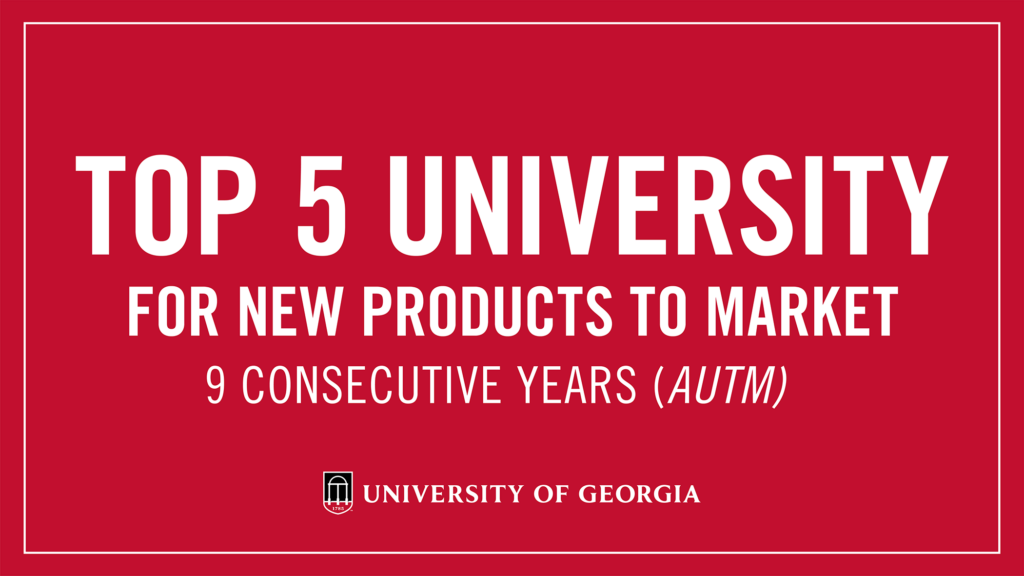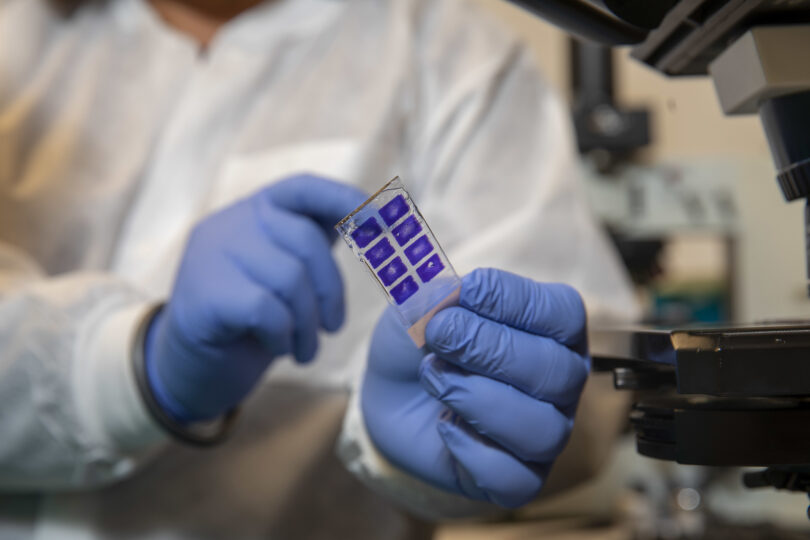The University of Georgia ranks No. 2 among U.S. universities for number of commercial products to market based on its research, according to an annual survey conducted by AUTM. It is the ninth straight year UGA has ranked among the nation’s top five in this metric and seventh straight year among the top two.
Fiscal year 2021, on which the new AUTM report is based, was another robust showing for UGA research and innovation, despite a few anticipated declines resulting from pandemic-related safety precautions. Among the 49 new products released that year based on UGA research were new poultry vaccines, animal health diagnostics, research and educational tools, and new blueberry, wheat, pearl millet, and ornamental plant varieties.
Several of these products will support Georgia’s multibillion-dollar poultry and agriculture industry. Others, like UGA-developed blueberries, are used on every continent except Antarctica.

“Being ranked first or second in new products for each of the past seven years is a testament to the innovative research conducted by our faculty and students, UGA’s commitment to research commercialization, and the success of our industry partners in bringing new products to the market,” said Derek Eberhart, associate vice president for research and executive director of Innovation Gateway, UGA’s technology transfer organization. “Commercialization of university research to benefit the public and promote economic development is integral to UGA’s land-grant mission.”
Formerly known as the Association of University Technology Managers, AUTM supports the development of academic research among universities and other research institutions. AUTM conducts an annual survey of intellectual property licensing and startup activities, and then turns the survey data into a report that ranks those institutions along several tech-transfer categories.
UGA also saw improvements in its rankings for licensing revenue and number of active licenses with industry. It earned $10.9 million in licensing revenue in FY21, moving up two spots to No. 27, and climbed one spot to No. 4 for active licenses. UGA entered the top 15 for U.S. public universities in new startups formed and number of operational startups, ranking No. 13 and No. 12 respectively.
In 2019, UGA created the Innovation District to support and catalyze its rapidly growing success in research commercialization and entrepreneurship. Under the district’s broad heading, the university has launched a number of new programs designed to help more faculty turn their discoveries into viable commercial products, either through licensing them to industry or forming their own startup companies.
Many of the new products brought to market are developed by startup companies founded by UGA researchers. For example, during FY21, UGA startup company Lectenz Bio released new reagents for the detection, operation or enrichment of specific glycoproteins and glycolipids. These tools give researchers the ability to test experimental reactions in real time, as well as start and stop such experiments more nimbly, saving valuable time and money.
Lectenz Bio, launched by Professor Rob Woods and colleagues at UGA’s internationally renowned Complex Carbohydrate Research Center, is dedicated to providing novel, effective glyco-research and bioprocessing tools.
The latest development for the Innovation District, capitalizing on the university’s historical strengths in agriculture and agricultural technologies, is the creation of the Institute for Integrative Precision Agriculture. Founded in 2022, IIPA’s mission is to leverage UGA research strengths across a range of related disciplinary areas, as well as work with partners in both industry and academic, to pioneer new approaches that can help sustainably feed a growing global population.
“Bringing the technologies we create through research to market for the benefit of people in our state and beyond is one way UGA lives up to the ideals of its land-grant mission,” said Karen Burg, vice president for research. “I’m proud of the work our team in the Innovation District does to support the UGA faculty working to maximize the benefits of their research, just as I’m proud of those faculty for their tireless passion and creativity. Together, these efforts fuel the generation of new products and solutions that ultimately benefit us all.”








